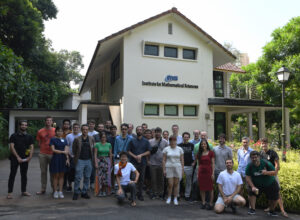Organizing Committee
Co-chairs
- Georgios Piliouras (Singapore University of Technology and Design)
- Marco Scarsini (Libera Università Internazionale degli Studi Sociali Guido Carli)
Members
- Panayotis Mertikopoulos (Centre National de la Recherche Scientifique and Université Grenoble Alpes)
- Asu Ozdaglar (Massachusetts Institute of Technology)
- Francesca Parise (Cornell University)
Contact Information
General Enquiries: Ims-enquiry(AT)nus.edu.sg
Scientific Aspects Enquiries: marco.scarsini(AT)luiss.it
Overview
The program aims at studying emerging questions on game theory and applications thereof. Some of the most relevant topics of investigation in game theory revolve around the idea of solution concept for a game, the complexity of its calculation, the ability of agents to learn it, its efficiency, and its nature when the game must satisfy some constraints, such as the ones imposed by an underlying network structure.
The program will include two workshops and one tutorial.
The first workshop will deal with games on networks. In many social and economic settings, decisions of individuals are affected by the actions of their peers. Examples include adoption of new products and innovations, opinion formation, social learning, public good provision, financial exchanges, and international trade. Network games have emerged in the last decade as a powerful framework for analyzing this type of strategic interactions by combining elements of network and game theory. In a network game a player’s payoff depends only on the actions of her neighbors. Such a framework is general enough to cover many setups of practical interest. There has been much work in the past couple of years on providing fundamental theoretical tools for the analysis of network games and on studying substantive economic and social questions within this framework. A key concern has been to understand the effect that the underlying pattern of interactions or the network structure have on shaping equilibrium outcomes. Other research focused on analyzing how information propagates over a network and how individuals form beliefs and opinions. Finally a third area of research focused on market and financial interactions within networked environments.
The second workshop will focus on learning and games. Studying learning dynamics in games is a natural starting point in an attempt to understand and predict the behavior of rational agents in interesting situations. Mathematicians, computer scientists and economists recognized the key computational phenomenon of learning in game dynamics and made it an important part of game theory’s mathematical repertoire. Our workshop will focus on the connections between learning in games, dynamical systems and optimization theory. Dynamical systems offer a powerful mathematical theory to address questions on learning in games (e.g., do dynamics converge?). There are strong connections between online optimization and game theory. The former can indeed be described as a game where the decision maker is facing the environment. At every period they both make some decisions and this process results in some overall payoff that the player aims to maximize. In a stochastic or adversarial environment agents typically try to predict the frequency of future events and respond optimally to those, which is referred to as regret minimization or calibration.
The blockchain mechanism design tutorial will present recent results on market structures and mechanisms for the operation of decentralised blockchain networks. Blockchain networks follow protocols, which must incentivise their clients to follow some honest protocol behaviour. When the protocol is followed, the blockchain network provides secure and valuable blockspace, a novel economic good aggregating multiple resources such as data or computation. Allocating scarce blockspace to user demand motivates novel market design questions, as any such market must navigate constraints unique to both the decentralised blockchain environment and the nature of blockspace itself. We offer an introduction to participants of the tutorial, along with a review of current questions and results from practitioners and academics.
Activities
The IMS will be closed on 7 April 2023 for Good Friday public holiday.
Venue
IMS Auditorium
Other Funding Support
This workshop is partially supported with grants from the IEEE Control Systems Society.


